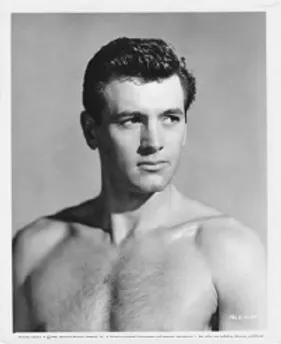Today we travel to the golden age of Hollywood with a documentary on Rock Hudson.
Rock Hudson: All That Heaven Allowed is a 2023 documentary and Tribeca Festival Official Selection for this year. This film pulls back the curtain on the Hollywood heartthrob’s private life as a gay man and his unintentional role as an AIDS activist before his untimely death of the disease in 1985. Moreover, this documentary touches upon Hudson’s efforts to boost his masculine appeal that included marriage as well as the struggle of having to remain closeted as a major celebrity during the 50s all the up to the 80s. This film is 1 hour 45 minutes in length and is recommended for viewers 14 years of age and older on account of coarse language along with sexual situations. It is currently streaming on Max and is also available to watch on Hulu and Amazon Prime Video with premium subscriptions.
Before he was known as Rock Hudson, a young Roy Harold Fitzgerald aspired to be an actor when he grew up, but he kept his dream a secret due to the fear of being seen as gay. In the 1930s, societal norms dictated that boys take on tough, strong jobs like that of being a police officer or a firefighter. It is just as important to bear in mind that homosexuality, unfortunately, was regarded as a mental illness by the medical establishment; this notion would persist until 1973. Once Rock made it to Los Angeles, his partner at the time introduced him to Henry Wilson who would oversee Hudson’s transformation into a movie star.
Following the second World War, there was a shift in masculinity, which was attributed to the proliferation of images featuring sailors and soldiers. Therefore, Rock was taught to ride horseback, lower the pitch of his voice, and pose to highlight his physical assets as in the photo below. While he embodied this virile personality in public, his friends, along with home video footage, attest to his homosexuality. At the age of 29, with rumors swirling as to why Hudson had not settled down, Rock entered into a lavender marriage (a term referring to a marriage consisting of at least one non-heterosexual partner) with rumored bisexual Phyllis Gates—Henry Wilson’s secretary. To keep his sexuality a secret from the tabloids, Hudson had to make sure photos with his many partners remained out of circulation and would sneak into hotel rooms after they were booked. Two years after they were married, Hudson divorced Gates, which allowed him to expand his connection with the gay community as he hosted popular clothing-optional pool parties with attractive gay men.

1981 saw the election of President Ronald Reagan into the White House and reports by the CDC of what would later be called AIDS. Three years later Hudson was formally diagnosed with the disease. However, Hudson’s condition was not released to the press for more than a year. His guest appearances on the hit drama, Dynasty, sparked health concerns since he appeared gaunt. With a conservative political climate together with staunch condemnation from religious groups, Hudson had limited support in the throes of AIDS. Even his good friend Nancy Reagan refused to help Hudson receive treatment based on the administration’s avoidance of the issue. But not everyone stood idly by, actress Elizabeth Taylor took it upon herself to raise money for AIDS research through benefits, and Hudson contributed $250,000 to amfAR (the Foundation for AIDS Research). On October 2, 1985, Rock Hudson died in his sleep from complications of AIDS.
Through his public battle with the disease, Rock Hudson proved to the world that no one is immune from contracting AIDS, not even a celebrity. Not only this but he added to the perception of what gay men could be. That is, gay men can be just as masculine as their straight counterparts. His notoriety brought greater attention to an issue that was being neglected because it affected a largely gay population.
Cinematically, this documentary provides a greater understanding of Hollywood and the closet. The filmmakers do a remarkable job of chronicling Hudson’s life by including interviews with his friends, fellow actors, sound bites from Hudson, pictures, and audio recordings. With this being said, the documentary falls short when it attempts to utilize scenes from Hudson’s filmography to make a connection back to the topic at hand. These clips are ill-fitted. It would have been better to simply use still images in their place.
Hudson’s sudden switch from an archetype of American masculinity to a prominent figure in the fight against AIDS is a reminder to those particularly in the LGBTQ+ community to not forget the forerunners who came before them by raising awareness and coming out. Although progress has been made in preventing and treating HIV with medication, there remains no cure for the AIDS virus.
If you have any questions about your identity, would like to come out, or would like to discuss safe sex practices, or have questions on HIV/AIDS with a peer support volunteer, please contact the National LGBT Help Center through the support services listed below.
Lesbian, Gay, Bisexual, and Transgender (LGBT) National Hotline: 1-888-843-4564
LGBT National Coming Out Support Hotline: 1-888-688-5428 (1-888-OUT-LGBT)
LGBT National Youth Talkline: 1-800-246-7743 (1-800-246-PRIDE)
LGBT National Senior Hotline: 1-888-234-7243
You can also reach out online at www.LGBThotline.org/chat

